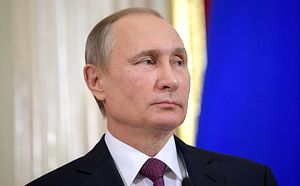Acrimony in the Russia-U.S. relationship seemingly knows no geographic bounds, and if Moscow hoped that Washington would pay more heed to Russian interests on the Korean Peninsula, the Kremlin has gotten its wish. The United States’ consideration toward Russia’s role in the Korea crisis, however, has not been positive. Rather, Moscow’s perceived failure to enforce economic sanctions against North Korea has recently drawn ire from the highest rungs of the U.S. government.
The most widespread explanation for the Russian Federation’s policies toward North Korea are couched in the narrative of great power competition between Russia and the United States in the context of Russia’s pursuit of a multipolar global order. Russia, the thinking goes, is attempting to thwart the U.S.-led order by supporting countries that share Moscow’s enmity toward Washington. More specific examples of this line of thinking assert that the Kremlin is attempting to supplant the United States as a global leader, and that Vladimir Putin views both North Korea and Russia as victims of U.S. policy locked in a common struggle against American hegemony.
Certainly these viewpoints on Russia’s position in the Korea crisis have merit, but they don’t tell the whole story. Inspection of the Russian Federation’s policies toward North Korea from a Northeast Asian regional perspective reveals that narrower interests shape Moscow’s position on the Korean security crisis as well.
Russia hopes to shape the Northeast Asia security environment in line with its interests at a time of diminishing influence. Around the time of North Korea’s first nuclear test in 2006, Yong-chool Ha and Beom-shik Shin argued that China’s increasing challenge to U.S. hegemony in the Pacific had prompted Beijing and Washington to pursue a bilateral geopolitical balance. This, however, caused alarm in Moscow, which perceived that it was losing influence in Northeast Asia. Specific to the Korean security crisis, Russia at that time found itself unwilling to align itself too closely with either China or the United States in its nonproliferation policy toward the Korean Peninsula.
Nearly 12 years after Pyongyang’s first successful nuclear test, Beijing and Moscow’s respective policies toward North Korea have grown increasingly aligned. Nevertheless, the Russian Federation remains an independent operator in the saga of Pyongyang’s ambitions. In light of Moscow’s diminished influence, Russia is essentially attempting to play multiple roles in the Korea crisis, including diplomatic facilitator and regional power broker. In this way, it can keep its voice in the game and mitigate the risk of being drowned out by China and the United States.
Digging further beyond Russia’s position within the dynamics of Northeast Asia’s interstate relations, the Russian government, despite domestic policy implementations that buttress recent UN sanctions, has allegedly failed to honor its commitment to economic sanctions against Pyongyang. Potential explanations for Moscow’s laxity in cracking down economically on Pyongyang, based on Russia’s regional interests, include the Kremlin’s desire to keep open economic opportunities for itself on the Korean Peninsula for the sake of developing the Russian Far East, as well as a desire to maintain the status quo in North Korea. Implementing economic measures not in Russia’s favor, while possibly helping to advance to goal of North Korean disarmament, would not position the Russian Federation to reap the economic benefits that the Korean Peninsula’s proximity to the Russian Far East offers.
In the case of the most recent allegations, that Russia allowed North Korea to use its facilities to ship coal to Japan and South Korea, market economics is at play. North Korea is rich in anthracite coal, and Russia offers to get Pyongyang’s wares to market despite the current prohibition. Given Moscow’s interest in developing its Far Eastern territories, as maddening as a lack of Russian compliance in the sanctions regime is for many other parties, the Russian Federation is hard pressed to sacrifice the possibility of generating income through transit fees at its ports. Furthermore, Moscow fears that excessive punitive economic measures could cause the Kim regime to collapse, after which political instability may ensue, creating an unfavorable situation directly on Russia’s Pacific periphery.
Russian policies have doubtlessly frustrated efforts at curbing Pyongyang’s ambitions. The world-level great power dynamic between the Russian Federation and the United States can offer some insight into Russia’s North Korea policy. Nevertheless, regional specifications in Northeast Asia also affect Russia’s policies toward North Korea and the effectiveness of international efforts at curbing its WMD program.
Anthony V. Rinna is a Senior Editor at Sino-NK, specializing in Russian foreign policy in East Asia. He currently resides in South Korea.
































